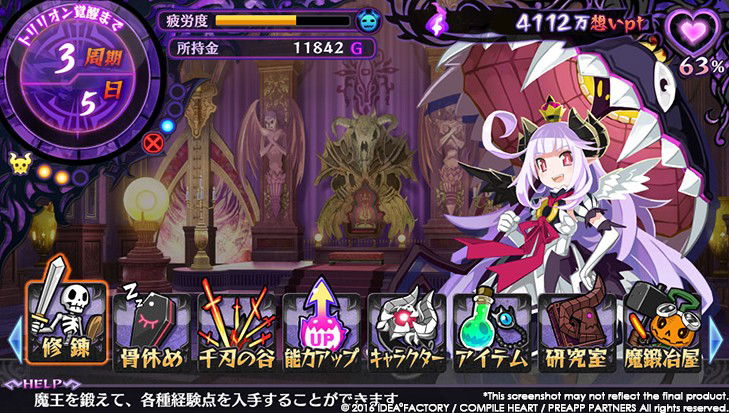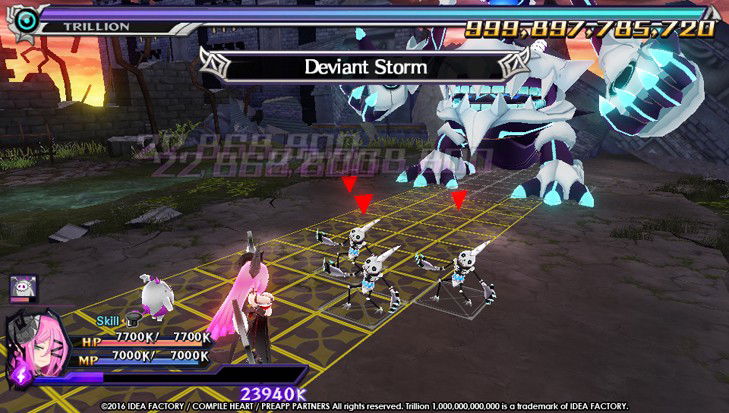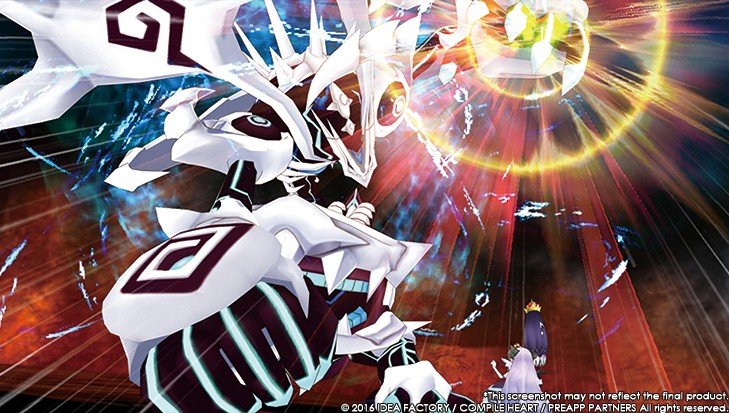Tactical RPG games aren’t one in a dozen. Games like Disgaea and Valkyria Chronicles put this genre on the map as of late, and there hasn’t been a better time for companies to innovate the genre. Trillion: God of Destruction is one title that aims to do just that. The question is, does it succeed in its quest to change the game, or does it do just a little too much, to achieve too little?
Game Name: Trillion: God of Destruction
Platform(s): PlayStation Vita, PC/Steam (Reviewed)
Publisher(s): Idea Factory International
Developer(s): Compile Heart
Release Date: March 29, 2016 (PlayStation Vita); November 7, 2016 (Steam)
Price: $29.99
For what it’s worth, Trillion: God of Destruction has a pretty damn fantastic story, rooted in Christian mythology. To keep it short and sweet: God and his brothers were straight chillin’, ruling the Heavens, the Human World, and the Underworld. That is until Satan decides to straight up wreck sh*t, and during the process starts to revolt against the Heavens. Satan gets his crew, known as the Fallen Ones, to rule the Underworld. Fast forward to the present, and we’re now with the third Great Overlord of the Underworld, Zeabolos, who now faces the threat of what is known as the “God of Destruction.” Zeabolos and his brother Astaroth both go after the God of Destruction, getting killed in the process, but Zeabolos is revived by Faust, who now owns his soul. Now in a semi-useless state (he totally has the Nash from Street Fighter V look,) Zeabolos must now select from one of his 6 Overlords, each representing a Deadly Sin, to beat Trillion – the God of Destruction.

The character development in this game is 100% on point, even with the English VAs, you easily identify with the cast of characters. Zeabolos is the fearless, yet stoic ruler that everyone looks up to, Perpell is quite the adorable glutton, Mammon is greedier than a Rothschild, Ruche is proud to a fault, Fegor exemplifies sloth and laziness, Levia is essentially the jealous girlfriend and Ashmedia is hotter than hell…and wants to f*ck everything in sight, incestuous or otherwise.
Even with these individually diverse characters, their intermingling proves to be exceedingly immersive. You get to know their fears and their passions, where they thrive and where they feel unease. Even when it can feel overly fan-service heavy, Trillion does a fantastic job of bringing the story back on track, and that’s something at a premium with a lot of story driven games nowadays. Even the 2D art looks like a masterpiece that obviously took quite some time to refine.

Unfortunately, that’s where the praise has to stop. Despite the beautiful storytelling, everything else is an unfortunate mess. Once you pick your Overlord, you then begin the tedious task of training, where everything is menu-based. Training, leveling up your stats, your weapons, managing fatigue, EVERYTHING. Nothing is left to skill, it is all up to RNGesus (for those who don’t get the reference, your training results are all left up to a basic random number generator.) You’ll have a specific number of cycles (or weeks, as each cycle lasts 7 days) to train up to battle Trillion, who not-so-ironically has 1 trillion hit points. Keep in mind, your character isn’t going to be the strongest, so the downfall of your Overlord is truly a foregone conclusion as you try to take Trillion down. The only real consolation is that Trillion’s life gets chipped down as you defeat a part of it, but still, it doesn’t take away from the sheer mundane nature of the game itself. After every cycle, you get to fight Mokujin, who mimicks Trillion’s attacks, until you get to the main battle with Trillion itself.
Another point of contention that I had with Trillion was the Valley of Swords, which in my opinion, of course, was a poor attempt of including rogue-lite mechanics into the game. Each dungeon has only one floor, and you have a limited amount of steps to beat the enemies, grab all the treasure you can and get to the exit portal. Needless to say, this can be an uninteresting task to undertake.

Now for the combat. It’s clunky. It’s stiff. It’s very annoying. You move your character around the board using the left stick, however, it seems like a new enemy spawns itself every 2 steps, and that becomes a nuisance after a while. Attacking isn’t very precise, and it feels like work to get your Overlord into the position that they need to be in order to attack Trillion or Mokujin. There isn’t much that I want to say, other than it’s a massive failure at innovating the genre. I don’t think I could say anything more that could express my discontent with this game.
That’s not to say that if you’re still going through with playing through the game that you’ll have a bad time. The PC port of this game runs smoothly, with no frame drops. It runs at a stable 60fps on my machine which consists of an Intel Xeon E3-1231 v3 (comparable to an i7), AMD R9 380X and 8GB of DDR 3 memory running Windows 10.
Trillion: God of Destruction is currently on the PC via Steam, as well as the PlayStation Vita.
*Trillion: God of Destruction was provided to us by Idea Factory International for review purposes. For more information on how we review video games and other media/technology, please go review our Review Guideline/Scoring Policy for more info.
Overall
I cannot mince words here; Trillion seems like a gigantic waste of time. For a game with such potential, it squanders it so badly, that even I couldn’t be bothered with it after playing the game for 8 hours. It is extremely tedious, everything seems pointless, the combat and movement are clunky…it just doesn’t feel good at all. You might as well call this game RPG Simulator 2015 since that’s exactly what it seems like. Despite the exceptionally engaging storytelling, this game falls completely on its face.
Pros:
- The story is exceptionally told.
- An example of excellent character development
Cons:
- The gameplay is extremely bland and tedious
- Movement and combat are extremely clunky
- Lather, rinse, repeat gameplay.
-
Trillion feels like work, and it's not the fun kind.


